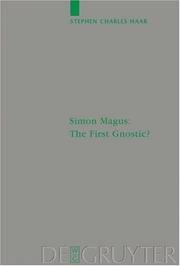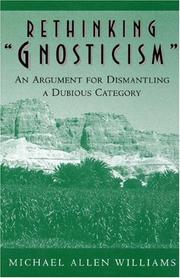| Listing 1 - 3 of 3 |
Sort by
|

ISBN: 3110176890 3111869601 3110898829 9783110898828 9783110176896 Year: 2003 Volume: 119 Publisher: Berlin de Gruyter
Abstract | Keywords | Export | Availability | Bookmark
 Loading...
Loading...Choose an application
- Reference Manager
- EndNote
- RefWorks (Direct export to RefWorks)
Diese neue umfassende Studie zu Simon Magus verleiht der Erforschung der frühen Christenheit und den Fragen nach Herkunft und Wesen des Gnostizismus neuen Nachdruck. Der Autor geht dabei von der traditionellen Exegese von Act 8,5-24 - der ersten narrativen Quelle zu Simon - und den späteren Berichten antiker christlicher Schriftsteller aus. In einem Überblick zur Literatur der griechisch-römischen Antike wird der Einfluss der Begriffe "magisch" und "die Magier" auf die Wahrnehmung und Beschreibung Simons bestimmt. Schließlich bezieht der Autor sozialwissenschaftliche Erklärungsmodelle und moderne Bestimmungen von "Identität" ein und gibt damit der Diskussion um das Phänomen Simons neue Impulse. This latest comprehensive work on Simon Magus lends new impetus to the investigation of Early Christianity and questions surrounding the origin and nature of Gnosticism. Major contributions of this study include: (1), a departure from the traditional exegesis of Acts 8, 5-24 (the first narrative source of Simon), and the later following reports of ancient Christian writers; (2), an overview of the literature of Graeco-Roman antiquity to determine the contribution of "magic" and "the Magoi" in the development of perceptions and descriptions of Simon; and (3), the inclusion of social science explanation models and modern estimations of "identity", in a creative approach to questions surrounding the phenomenon of Simon.
Gnosticism --- 273.1 SIMON MAGUS --- Gnosis. Gnosticisme--SIMON MAGUS --- Theses --- 273.1 SIMON MAGUS Gnosis. Gnosticisme--SIMON MAGUS --- Simon, --- Simon Magus, --- Cults --- Gnosticism.
Book
ISBN: 9783110240580 3110240580 9783110240597 1282716166 9786612716164 3110240599 9783110217315 3110217317 3110208083 9783110208085 9781282716162 6612716169 Year: 2010 Volume: 96 Publisher: Berlin New York Walter de Gruyter
Abstract | Keywords | Export | Availability | Bookmark
 Loading...
Loading...Choose an application
- Reference Manager
- EndNote
- RefWorks (Direct export to RefWorks)
Ausgangspunkt dieses in zweiter Auflage durchgesehenen und ergänzten Bandes ist ein Exkurs im Bellum Iudaicum des hier dem Ambrosius zugeschriebenen sog. Hegesippus über den Wettstreit des Petrus mit Simon Magus in Rom und die sich daran anschließende Christenverfolgung Neros, in der die Apostel Petrus und Paulus das Martyrium erleiden. Die Frage nach den Quellen dieser Episode und deren Historizität führt zu einer Überprüfung der "Schlüsselbeweise" für einen Aufenthalt des Petrus in Rom und der sonstigen literarischen Zeugnisse vom Neuen Testament bis in die Spätantike. Im Vordergrund stehen die apokryphen Apostelakten, der 1. Clemensbrief, Iustinus Martyr, Dionysios von Korinth, Polykarp von Smyrna und die Antihäretiker Hegesippus und Irenäus von Lyon. Die vermeintlich echten Briefe des Ignatius von Antiochien werden in den Rahmen christlicher und heidnischer Pseudepigrapha der Zweiten Sophistik eingeordnet, ihre Entstehungszeit auf das Jahrzehnt 170-180 festgelegt. Ein breites Kapitel ist philologischen Untersuchungen zur Datierung des 1. Clemensbriefes und der Spätschriften des Neuen Testamentes gewidmet. Am Ende steht eine kritische Edition (mit Übersetzung) der Martyrien des Petrus und des Paulus unter Berücksichtigung einer hier erstmalig eingeführten griechischen Handschrift, die ein bisher nicht bekanntes Selbstporträt des Paulus enthält.
Apocryphal Acts of the Apostles --- Criticism, interpretation, etc --- Peter, --- Paul, --- Simon, --- Homes and haunts --- Death and burial --- In literature --- Passio Petri et Pauli --- Martyrologies --- Actes apocryphes des Apôtres --- Martyrologes --- Commentaries --- History and criticism. --- Commentaires --- Histoire et critique --- Clement --- Pseudo-Ignatius, --- Passio Petri et Pauli. --- Acta Pauli / Martyrium Pauli. --- Acta Petri / Martyrium Petri. --- Apocryphal Acts of the Apostles --Criticism, interpretation, etc. --- Clement --I, --Pope. --First epistle of Clement to the Corinthians. --- Martyrologies --History and criticism. --- Paul, --the Apostle, Saint. --- Peter, --the Apostle, Saint --Death and burial. --- Peter, --the Apostle, Saint --Homes and haunts --Rome. --- Peter, --the Apostle, Saint --In literature. --- Peter, --the Apostle, Saint --Legends. --- Pseudo-Ignatius, --of Antioch. --- Simon, --Magus, --1st cent. --- Acts (Apocryphal books) --- Acts of the Apostles (Apocryphal books) --- Cephas, --- Pedro, --- Pietro, --- Simon Bar Jona, --- Simon Peter, --- Simon Petrus, --- Christianity --- Religion --- Philosophy & Religion --- History and criticism --- Petrus, --- Necrologies --- Apocryphal books (New Testament) --- Criticism, interpretation, etc. --- Christenverfolgungen. --- Erster Clemensbrief. --- First Clement. --- Ignatius of Antioch. --- Ignatius von Antiochien. --- Neues Testament. --- New Testament. --- Persecution of Christians. --- Simon Magus. --- RELIGION / Bible / General. --- Petrus --- Pierre --- Peter --- Acta Pauli --- Acta Petri --- Rom. --- Apocryphal Acts of the Apostles - Criticism, interpretation, etc. --- Petrus ap. --- Romae commoratio --- Peter, - the Apostle, Saint - Homes and haunts - Rome --- Peter, - the Apostle, Saint - Death and burial --- Peter, - the Apostle, Saint - In literature --- Peter, - the Apostle, Saint - Legends --- Paul, - the Apostle, Saint --- Simon, - Magus, - active 1st century --- Peter, - the Apostle, Saint

ISBN: 0691005427 0691011273 1400822211 1282753193 9786612753190 1400813832 9781400822218 1400808537 9780691011271 Year: 1999 Publisher: Princeton, NJ
Abstract | Keywords | Export | Availability | Bookmark
 Loading...
Loading...Choose an application
- Reference Manager
- EndNote
- RefWorks (Direct export to RefWorks)
Most anyone interested in such topics as creation mythology, Jungian theory, or the idea of "secret teachings" in ancient Judaism and Christianity has found "gnosticism" compelling. Yet the term "gnosticism," which often connotes a single rebellious movement against the prevailing religions of late antiquity, gives the false impression of a monolithic religious phenomenon. Here Michael Williams challenges the validity of the widely invoked category of ancient "gnosticism" and the ways it has been described. Presenting such famous writings and movements as the Apocryphon of John and Valentinian Christianity, Williams uncovers the similarities and differences among some major traditions widely categorized as gnostic. He provides an eloquent, systematic argument for a more accurate way to discuss these interpretive approaches. The modern construct "gnosticism" is not justified by any ancient self-definition, and many of the most commonly cited religious features that supposedly define gnosticism phenomenologically turn out to be questionable. Exploring the sample sets of "gnostic" teachings, Williams refutes generalizations concerning asceticism and libertinism, attitudes toward the body and the created world, and alleged features of protest, parasitism, and elitism. He sketches a fresh model for understanding ancient innovations on more "mainstream" Judaism and Christianity, a model that is informed by modern research on dynamics in new religious movements and is freed from the false stereotypes from which the category "gnosticism" has been constructed.
Gnosticism. --- Rome --- Religion. --- Gnosticism --- 273.1 --- 273.1 Gnosis. Gnosticisme --- Gnosis. Gnosticisme --- Religion --- Cults --- Rome - Religion --- Against the Galilaeans. --- Agrippa Castor. --- Anchorite. --- Anthropomorphism. --- Anti-Judaism. --- Antinomianism. --- Antipope. --- Apocalypse. --- Apocrypha. --- Apocryphon. --- Apostasy. --- Asceticism. --- Blasphemy. --- Borborites. --- Cainites. --- Catharism. --- Celibacy. --- Cerdo (gnostic). --- Cerinthus. --- Christian Identity. --- Christian fundamentalism. --- Christianity. --- Church Fathers. --- Clement of Alexandria. --- Consubstantiality. --- Contra Celsum. --- Creation myth. --- Demiurge. --- Demonization. --- Dialogue with Trypho. --- Divine Spark. --- Doctrine. --- Elohim. --- Epiphanes (gnostic). --- Epistle to the Laodiceans. --- Ernst Troeltsch. --- Exegesis. --- Exorcism. --- False prophet. --- God. --- Good and evil. --- Gospel of Eve. --- Gospel of Philip. --- Heresy of the Free Spirit. --- Heresy. --- Heterodoxy. --- Holy Book of the Great Invisible Spirit. --- Ideal type. --- Incorruptibility. --- Infidel. --- Irenaeus. --- Jews. --- Judaism. --- Judas Iscariot. --- Justification (theology). --- Justin Martyr. --- Manichaeism. --- Marcion of Sinope. --- Marcionism. --- Martyr. --- Metempsychosis. --- New religious movement. --- Nicolaism. --- Orthodox Judaism. --- Plotinus. --- Predestination. --- Problem of evil. --- Pseudo-Philo. --- Puritans. --- Pythagoreanism. --- Reform Judaism. --- Religious text. --- Renunciation. --- Sacred prostitution. --- Satan. --- Sect. --- Secularization. --- Self-denial. --- Sethianism. --- Sexual Desire (book). --- Sexual abstinence. --- Simon Magus. --- Skepticism. --- Sophia (Gnosticism). --- Spiritual marriage. --- Spirituality. --- Superiority (short story). --- Tertullian. --- The Other Hand. --- Theodicy. --- Theodotus of Byzantium. --- Theology. --- Thou shalt not commit adultery. --- Thou shalt not covet. --- Tractate. --- Wickedness. --- Writing. --- Zostrianos.
| Listing 1 - 3 of 3 |
Sort by
|

 Search
Search Feedback
Feedback About UniCat
About UniCat  Help
Help News
News